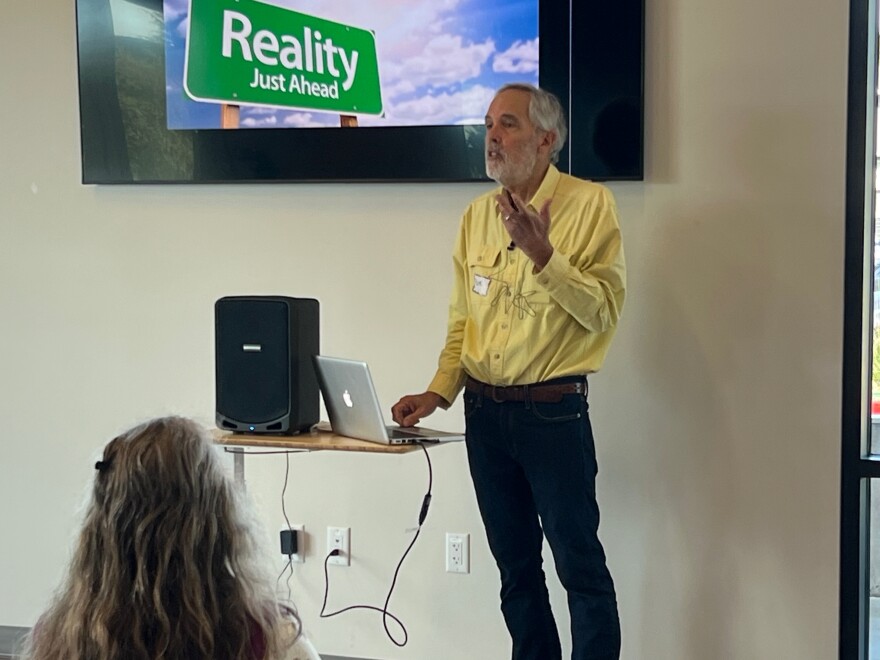A one-mile stretch of Highway 1 in Capitola will close for 24 hours this weekend to accommodate work on the years-long, $270 million reconstruction of the freeway in Santa Cruz County. Weather permitting, authorities will close the freeway between the Park Ave. and Bay/Porter exits from 7:00 p.m. Saturday until 7:00 p.m. Sunday.
Kevin Drabinski, a district spokesperson for CalTrans, said detours will route motorists off the freeway at both exits, and California Highway Patrol officers will assist with traffic. But, he said drivers might want to consider avoiding the area this weekend.
“They can make their own decisions on staying away from the area. Or, if they have to go through it, they'll be aware of the delays. But we want to get that information out so that people can make the best decisions on travel during that time,” he said.
Crews are tearing down the 85-year-old bridge to allow for widening the freeway, adding new auxiliary lanes in each direction. Next year, the Capitola Ave. crossing will be replaced with a new, wider bridge.

The weekend construction marks an important milestone in the long-awaited freeway reconstruction, said Project Manager Sarah Christensen with the Santa Cruz County Regional Transportation Commission.
“Construction is inconvenient and can be impactful, but the final result will truly be transformational,” she said. “Obviously the intent is to reduce congestion. But it's not just about congestion, it's about the safety of the system as well.”
Christensen, a Santa Cruz native who previously worked on multiple highway projects in the Bay Area, said plans also include widening the freeway shoulders for safety.
She said the idea is to create a comprehensive system that encourages other forms of transportation including bicycles and expanded bus service. In addition to improving traffic on Highway 1, the project aims to reduce traffic jams on chronically clogged surface streets.
“My mom lives in Watsonville and commutes across the county, and she has her route. She takes Sumner Avenue and she goes off on to the local street network. And a lot of people do that,” she said. “But with these improvements, it should result in not just the highway being a better commute route, but also the local streets should see some benefit as well.”

She said the weekend work in Capitola is the effective start of phase two of the three-phase project. Phase one, which is well underway, involves adding auxiliary lanes and other improvements between Soquel Drive and 41st Ave., as well as a new pedestrian and bicycle overpass under construction at Chanticleer Ave. That phase should be complete next year.
The second phase will extend the auxiliary lanes to State Park Drive in Aptos, as well as replacing the Capitola Ave. overpass and adding another pedestrian and bicycle crossing at Mar Vista Ave. in Aptos. It should be complete in 2026. That same year, a third phase is scheduled to begin — the largest and most expensive of the three phases. It will extend the improvements to Freedom Blvd. in Aptos, with more auxiliary lanes and four additional pedestrian and bicycle crossings.
“The Regional Transportation Commission has a vision to develop a sustainable transportation system,” Christensen said.
But like any transportation project in Santa Cruz, this one has plenty of critics.
Rick Longinotti of Santa Cruz is chairman of The Campaign for Sustainable Transportation, which, along with the Sierra Club, has sued the state in Sacramento County Superior Court to halt the final phase of the project. That is the only phase that is not fully funded.
Longinotti said that despite the planners’ promises, the project will not reduce freeway congestion.

“That's a dream,” he said. That's not reality.”
Longinotti is not an engineer, but he cites CalTrans’ own Environmental Impact Report for the project showing slightly higher traffic volume and lower average speeds during the morning commute northbound in the first year of operation, which he alleges is due in part to a phenomenon known as “induced travel.”
“If you make it easier to drive in the short run, more people will get on the freeway,” he said. “People who wouldn't dream of getting on the highway between 4 and 6 p.m. start to do so. People switch from riding a bus. So for all these reasons, the highway gets congested again.”
The lawsuit demands that planners go back to the drawing board and consider more alternatives such as dedicated lanes for buses known as “Bus on Shoulder” lanes. The existing plan does call for a modified version of Bus on Shoulder lanes, limiting travel in portions of the new auxiliary lanes to buses during peak periods. But because passenger vehicles will also use the auxiliary lanes to exit the freeway, Longinotti said the arrangement will cause bottlenecks.

“We call this ‘bus stuck in traffic’ lanes,” Longinotti said.
Christensen declined to comment on the pending litigation, but she said the project will ultimately reduce vehicle traffic by encouraging other means of transportation.
“Because we have added a bunch of other multimodal improvements, like the bus improvements, as well as active transportation improvements. We actually are calculating a reduction in vehicle miles traveled as a result of these projects,” she said.
Nonetheless, Christensen said the construction timeline takes into account the inevitable legal challenges to a project this size. But the timeline is long. The final phase is not scheduled to be complete until 2029 or 2030, making construction on Highway 1 a fact of life in Santa Cruz County for at least the rest of this decade.



